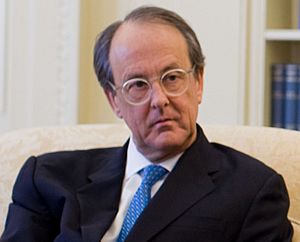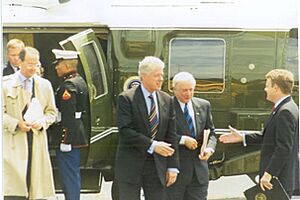Erskine Bowles facts for kids
Quick facts for kids
Erskine Bowles
|
|
|---|---|

Bowles in 2010
|
|
| 16th President of the University of North Carolina system | |
| In office October 3, 2005 – December 31, 2010 |
|
| Preceded by | Molly Corbett Broad |
| Succeeded by | Thomas W. Ross |
| Co-Chair of the National Commission on Fiscal Responsibility and Reform | |
| In office February 18, 2010 – December 1, 2010 Serving with Alan Simpson
|
|
| President | Barack Obama |
| Preceded by | Position established |
| Succeeded by | Position abolished |
| 19th White House Chief of Staff | |
| In office January 20, 1997 – October 20, 1998 |
|
| President | Bill Clinton |
| Deputy | Sylvia Mathews Burwell John David Podesta |
| Preceded by | Leon Panetta |
| Succeeded by | John Podesta |
|
|
| In office October 3, 1994 – January 11, 1996 |
|
| President | Bill Clinton |
| Preceded by | Philip Lader |
| Succeeded by | Evelyn S. Lieberman |
| 18th Administrator of the Small Business Administration | |
| In office May 7, 1993 – October 3, 1994 |
|
| President | Bill Clinton |
| Preceded by | Pat Saiki |
| Succeeded by | Philip Lader |
| Personal details | |
| Born | August 8, 1945 Greensboro, North Carolina, U.S. |
| Political party | Democratic |
| Spouse |
Crandall Close
(m. 1971) |
| Children | 3 |
| Parent |
|
| Education | University of North Carolina at Chapel Hill (BA) Columbia University (MBA) |
Erskine Boyce Bowles (born August 8, 1945) is an American businessman and political leader from North Carolina. He is known for serving as the 19th White House Chief of Staff for President Bill Clinton from 1997 to 1998. He also led the University of North Carolina system as its president from 2005 to 2010.
In 2010, Mr. Bowles worked with President Barack Obama as the Democratic co-chair of the National Commission on Fiscal Responsibility and Reform. This group looked for ways to improve the country's financial situation.
Contents
Early Life and Education
Erskine Bowles was born and grew up in Greensboro, North Carolina. His father, Skipper Bowles, was a politician from the Democratic Party.
Erskine went to Virginia Episcopal School and then to the University of North Carolina at Chapel Hill. He earned a business degree there. After a short time in the United States Coast Guard, he went to Columbia Business School and earned an MBA. An MBA is a special degree for people who want to work in business leadership.
After college, Mr. Bowles worked for a financial company called Morgan Stanley in New York City. He met his wife, Crandall Close, there. They got married in 1971 and moved to North Carolina. In 1975, Mr. Bowles helped start an investment banking company called Bowles Hollowell Conner. He worked in business until the 1990s.
Working with President Clinton
In 1992, Erskine Bowles became more involved in politics. He helped raise money for Bill Clinton's presidential campaign. After Clinton became president, he asked Mr. Bowles to lead the Small Business Administration (SBA) in 1993. The SBA helps small businesses grow and succeed.
From 1994 to 1995, Mr. Bowles served as President Clinton's White House Deputy Chief of Staff. This role helps manage the daily operations of the White House. After a short break, he became President Clinton's White House Chief of Staff in 1996. This is a very important job, as the Chief of Staff helps the president manage their schedule, staff, and important decisions. One of Mr. Bowles's main tasks was to help with talks about the country's budget between the White House and Congress. He left this role in 1998.
Running for Senate
Even though he was not sure about running for office at first, Mr. Bowles decided to try for the United States Senate after the events of September 11, 2001. He ran as a Democratic candidate in 2002 to represent North Carolina. He won his party's nomination but lost the election to Elizabeth Dole.
In 2004, Mr. Bowles ran for the Senate again. He faced Richard Burr and Tom Bailey. Both campaigns spent a lot of money, making it one of the most expensive races in North Carolina at the time. Despite being ahead in early polls, Mr. Bowles was defeated in this election as well.
In 2005, he accepted a job working for the United Nations as a special helper for countries affected by the Tsunami. He worked with Bill Clinton again in this role.
Leading the University of North Carolina
On October 3, 2005, the Board of Governors for the University of North Carolina chose Erskine Bowles to be the new President of the university system. He took over from Molly Corbett Broad.
One of his important decisions was to appoint Holden Thorp as the tenth chancellor of the University of North Carolina at Chapel Hill. Mr. Bowles also spoke at a special event to remember a student leader named Eve Carson who had passed away.
On February 12, 2010, Mr. Bowles announced that he would retire from the UNC System. Thomas W. Ross became the next president.
The Bowles-Simpson Commission
In 2010, President Barack Obama asked Erskine Bowles to co-chair the National Commission on Fiscal Responsibility and Reform with Alan K. Simpson. This commission was created to find ways to reduce the country's budget deficit, which is when the government spends more money than it takes in.
The commission worked hard, but its report on how to reduce the deficit was not officially adopted by the Obama administration. Mr. Bowles later said he believed the President decided to let others propose ideas first.
Later Career and Other Roles
Erskine Bowles has served on the board of directors for several large companies. These include General Motors, Morgan Stanley, and Norfolk Southern Corporation. He also served on the board of Facebook, Inc. starting in 2011.
In 2012, some people thought Mr. Bowles might run for Governor of North Carolina. However, he announced on February 2, 2012, that he would not seek the governorship. He continues to be involved in various organizations, including the Committee for a Responsible Federal Budget.
Images for kids
 | Anna J. Cooper |
 | Mary McLeod Bethune |
 | Lillie Mae Bradford |



